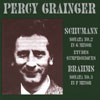Percy Grainger Recital
View record and artist detailsRecord and Artist Details
Composer or Director: Robert Schumann, Johannes Brahms
Label: Biddulph
Magazine Review Date: 4/1993
Media Format: CD or Download
Media Runtime: 75
Mastering:
Mono
ADD
Catalogue Number: LHW008

Tracks:
| Composition | Artist Credit |
|---|---|
| Sonata for Piano No. 2 |
Robert Schumann, Composer
Percy Grainger, Piano Robert Schumann, Composer |
| (3) Romanzen, Movement: F sharp |
Robert Schumann, Composer
Percy Grainger, Piano Robert Schumann, Composer |
| (8) Fantasiestücke, Movement: No. 3, Warum? |
Robert Schumann, Composer
Percy Grainger, Piano Robert Schumann, Composer |
| Etudes symphoniques, 'Symphonic Studies' |
Robert Schumann, Composer
Percy Grainger, Piano Robert Schumann, Composer |
| (16) Waltzes, Movement: No. 15 in A flat |
Johannes Brahms, Composer
Johannes Brahms, Composer Percy Grainger, Piano |
| Sonata for Piano No. 3 |
Johannes Brahms, Composer
Johannes Brahms, Composer Percy Grainger, Piano |
Author:
Percy Grainger made his recital debut at the Melbourne Masonic Hall in 1894; he had studied first with his mother, then with the Anton Rubinstein pupil Louis Pabst, and later received guidance from none other than Busoni. Although best remembered today as a composer (fortunately for us, his creative versatility is now reflected in healthy catalogue representation), Grainger was for years a respected and popular piano recitalist. But his records have always been comparative rarities: an Imprimatur LP of the 1926 Brahms F minor Sonata, reissued here, appeared in 1981 and was reviewed by RL in February the following year (nla), and Pearl have issued a certain amount of material on CD (including the Schumann G minor Sonata—(CD) GEMMCD9957—also offered here by Biddulph); but this is the first disc to include a truly substantial sampling of Grainger in larger-scale works.
The most striking aspect of Grainger's playing is its honesty and directness. In the Schumann G minor he tackles the impassioned opening without flinching, yet his phrasing of the finale's second set is hauntingly lyrical. His account of that composer's Etudes symphoniques has a re-creative drive that only composer-interpreters seem to generate, and the same might be said for his limpid handling of Schumann's ''Warum?'' (Fantasiestucke). Best, though, is a truly heroic reading of Brahms's youthful F minor Sonata—one of the few that actually succeeds in making the work sound like a young man's music. Grainger sometimes indulges in the old-fashioned habit of spreading chords, and he's far from note-perfect: yet what grandeur there is in the opening Allegro maestoso, what elasticity of tempo in the Andante espressivo (where he seems almost to tumble through those opening measures) and, most impressively, what unbuttoned bravura in the Scherzo. Note, too, his caressing of the finale's grand second theme—second only to Harold Bauer's (due from Biddulph). This is the playing of a man who lived his music, and whose hands served to liberate spontaneous interpretative ideas. I warmly commend it to you, especially in such good transfers.'
The most striking aspect of Grainger's playing is its honesty and directness. In the Schumann G minor he tackles the impassioned opening without flinching, yet his phrasing of the finale's second set is hauntingly lyrical. His account of that composer's Etudes symphoniques has a re-creative drive that only composer-interpreters seem to generate, and the same might be said for his limpid handling of Schumann's ''Warum?'' (Fantasiestucke). Best, though, is a truly heroic reading of Brahms's youthful F minor Sonata—one of the few that actually succeeds in making the work sound like a young man's music. Grainger sometimes indulges in the old-fashioned habit of spreading chords, and he's far from note-perfect: yet what grandeur there is in the opening Allegro maestoso, what elasticity of tempo in the Andante espressivo (where he seems almost to tumble through those opening measures) and, most impressively, what unbuttoned bravura in the Scherzo. Note, too, his caressing of the finale's grand second theme—second only to Harold Bauer's (due from Biddulph). This is the playing of a man who lived his music, and whose hands served to liberate spontaneous interpretative ideas. I warmly commend it to you, especially in such good transfers.'
Discover the world's largest classical music catalogue with Presto Music.

Gramophone Digital Club
- Digital Edition
- Digital Archive
- Reviews Database
- Full website access
From £8.75 / month
Subscribe
Gramophone Full Club
- Print Edition
- Digital Edition
- Digital Archive
- Reviews Database
- Full website access
From £11.00 / month
Subscribe
If you are a library, university or other organisation that would be interested in an institutional subscription to Gramophone please click here for further information.




